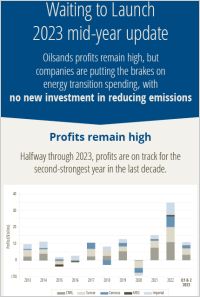
Photo: Pembina Institute
The consequences of climate change are escalating. This summer was Earth’s hottest three months in recorded history. Hazy skies were the norm in Canada as smoke from wildfires blew across the country. Nearly 70% of residents in the Northwest Territories had to evacuate their homes because of this year’s wildfires. Calgary, for its part, experienced its worst smoke season ever, with almost 500 hours of smoke recorded from May to September.
196 countries, including Canada signed the 2015 Paris Agreement, committed to limiting global warming to “well below 2°C” and to “pursue efforts to limit the temperature increase to 1.5°C above pre-industrial levels.” But July 2023 saw temperatures exceed the 1.5°C limit for the entire month and, less than two weeks before this year’s COP, average global temperatures surpassed the 2°C mark for the first time. Every tenth of a degree of warming means escalating risks and damages to the environment, communities and economies. Meanwhile, emissions continue to rise. According to the United Nations Environment Programme’s (UNEP) 2023 Emissions Gap Report, global emissions have increased by 1.2% from the previous year.
Action needed on the ground
As a G20 country and one of the largest contributors to climate change, Canada needs to continue delivering on its international climate commitments and ramp-up climate action across all sectors to make substantial progress on reducing emissions. In 2021, the Government of Canada committed to reducing greenhouse gas emissions to 40% to 45% below 2005 levels by 2030. This month’s report from the Federal Environment Commissioner noted that Canada is not on track to meet this international commitment. But responding to the climate crisis requires a nation-wide response and Canada’s obligation to reduce emissions must be a goal that is shared by all provinces and territories.
The current federal government has taken more action than previous governments: the proposed Clean Electricity Regulations would align Canada’s grid decarbonization with peer nations, and the transportation sector, which accounts for nearly 1/4 of Canada’s total emissions, has driven down emissions by 4% since 2005. But gaps remain.
 Canada is the fourth-largest oil producer in the world and The Production Gap Report (2023) shows oil production is set to increase through 2030. Despite improvements in emissions intensity and indications that methane regulations are starting to work, emissions in Canada’s oil and gas sector continue to rise. At COP26 in Glasgow in 2021, Prime Minister Trudeau said Canada would cap oil and gas emissions “today” and reduce them “tomorrow.” It is critical that Canada follow through on this commitment and implement a robust oil and gas emissions cap to ensure emissions from the sector decline. Doing so can also hold the industry accountable to its net-zero pledges and, with its record-breaking profits in 2023 does its share to contribute to achieving Canada’s climate targets.
Canada is the fourth-largest oil producer in the world and The Production Gap Report (2023) shows oil production is set to increase through 2030. Despite improvements in emissions intensity and indications that methane regulations are starting to work, emissions in Canada’s oil and gas sector continue to rise. At COP26 in Glasgow in 2021, Prime Minister Trudeau said Canada would cap oil and gas emissions “today” and reduce them “tomorrow.” It is critical that Canada follow through on this commitment and implement a robust oil and gas emissions cap to ensure emissions from the sector decline. Doing so can also hold the industry accountable to its net-zero pledges and, with its record-breaking profits in 2023 does its share to contribute to achieving Canada’s climate targets.
 The future of fossil fuels and the need to both reduce its use and decarbonize the sector is expected to be a key aspect of the negotiations at COP28. As a fossil-fuel producing country, Canada has the potential to lead in emissions reduction technology development, including carbon capture and storage (an important part of reducing emissions in polluting industries such as gas-fired power). With an abundance of renewable resources readily available, Canada also has the potential to lead in renewable energy development. And Alberta is at the convergence of these two matters.
The future of fossil fuels and the need to both reduce its use and decarbonize the sector is expected to be a key aspect of the negotiations at COP28. As a fossil-fuel producing country, Canada has the potential to lead in emissions reduction technology development, including carbon capture and storage (an important part of reducing emissions in polluting industries such as gas-fired power). With an abundance of renewable resources readily available, Canada also has the potential to lead in renewable energy development. And Alberta is at the convergence of these two matters.
A role for Alberta
A leader in energy production for decades, Alberta is simultaneously the highest-emitting province in Canada, with no plan in place to tangibly reduce emissions by 2030 yet was home to more than 3/4 of renewable energy development in Canada last year. Since 2019, $5.5 billion in renewable energy investments have blown into the province with more than $33 billion worth of projects proposed (although now in limbo due to the unnecessary seven-month moratorium on renewable energy development).
Going into this year’s climate negotiations, there is a sense of urgency. We need to reduce emissions and scale up deployment of renewable energy. With the first Global Stocktake (an assessment of progress made since adopting the Paris Agreement in 2015) taking place at this year’s COP there will be ample opportunity for Canada to identify its own gaps and move forward with taking ambitious action to reduce emissions.
Chris Severson-Baker is the Pembina Institute's executive director.



